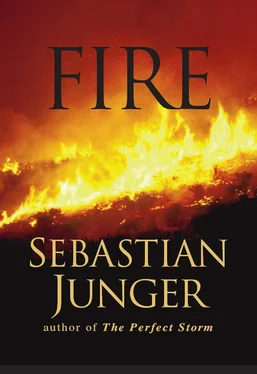“Good morning,” Dr. Abdullah corrected, nodding toward the Taliban positions across the valley. “Our day is just beginning.”
The shelling had started again, an arrhythmic thumping in the distance that suggested nothing of the terror it can produce up close. That morning, I’d awakened from a dream in which an airplane was dropping bombs on me, and in the dream I’d thrown myself on the ground and watched one of the bombs bounce past me toward a picnicking family. “Good,” I’d thought; “it will kill them and not me.” It was an ugly, ungenerous dream that left me unsettled all day.
Massoud knew where the Taliban positions were, and they obviously knew where his were, and the upshot was that you were never entirely safe. A guy in town had just had both legs torn off by a single, random shell. You couldn’t let yourself start thinking about it or you’d never stop.
Massoud was still at the binoculars. He had a face like a hatchet. Four deep lines cut across his forehead, and his almond-shaped eyes were so thickly lashed that it almost looked as if he were wearing eyeliner. When someone spoke, he swiveled his head around and affixed the speaker with a gaze so penetrating it occasionally made the recipient stutter. When he asked a question, it was very specific, and he listened to every word of the answer. He stood out not so much because he was handsome but simply because he was hard to stop looking at.
I asked Dr. Abdullah how Massoud’s back was doing. Dr. Abdullah spoke low so that Massoud couldn’t hear him. “He says it’s better, but I know it’s not,” he said. “I can see by the way he walks. He needs at least a month’s rest… but, of course, that won’t be possible.”
The shelling got heavier, and the sun set, and Massoud and his bodyguards and generals lined up on top of the bunker to pray. The prayer went on for a long time, the men standing, kneeling, prostrating themselves, standing again, their hands spread toward the sky to accept Allah. Islam is an extraordinarily tolerant religion—more so than Christianity, in some ways—but it is also strangely pragmatic. Turning the other cheek is not a virtue. The prophet Muhammad, after receiving the first revelations of the Koran in A.D. 610, was forced into war against the corrupt Quraysh rulers of Mecca, who persecuted him for trying to make Arab society more egalitarian and to unite it under one god. Outnumbered three to one, his fighters defeated the Quraysh in 627 at the Battle of the Trench, outside Medina. Three years later he marched ten thousand men into Mecca and established the reign of Islam. Muhammad was born during an era of brutal tribal warfare, and he would have been useless to humanity as a visionary and a man of peace if he had not also known how to fight.
It was cold and almost completely dark when the prayers were finished. Massoud abruptly stood, folded his prayer cloth, and strode into the bunker, attended by Dr. Abdullah and a few commanders. We followed and joined them on the floor. A soldier brought in a pot for us to wash our hands, then spread platters of rice and mutton on a blanket. Massoud asked Dr. Abdullah for a pen, and Dr. Abdullah drew one out of his tailored cashmere jacket.
“I recognize that pen, it’s mine,” Massoud said. He was joking.
“Well, in a sense everything we have is yours,” Dr. Abdullah replied.
“Don’t change the topic. Right now I’m talking about this pen.” Massoud wagged his finger at Dr. Abdullah, then turned to the serious business of preparing the offensive.
Massoud’s strategy was simple and exploited the fact that no matter how one looked at it, he was losing the war. After five years of fighting, the Taliban had fractured his alliance and cut its territory in half. Massoud was confined to the mountainous northeast, which, although easily defensible, depended on long, tortuous supply lines to Tajikistan. The Russians, ironically, had begun supplying Massoud with arms—with the Taliban near their borders, they couldn’t afford to hold a grudge—and India and Iran were helping as well. It all had to go through Tajikistan. The most serious threat to Massoud’s supply lines came last fall, when he lost a strategically important town called Taloqan, just west of the Kowkcheh River. The Taliban, convinced that recapturing Taloqan was of supreme importance to Massoud, shipped the bulk of their forces over to the Taloqan front. Massoud arrayed his forces in a huge V around the town and began a series of focused, stabbing attacks, usually at night, that guaranteed that the Taliban would remain convinced that he would do anything to retake the town.
In the meantime he was thinking on a completely different scale. Massoud had been fighting for twenty-one years, longer than most of the Taliban conscripts had been alive. In that context, Taloqan didn’t matter, the next six months didn’t matter. All that mattered was that the Afghan resistance survive long enough for the Taliban to implode on their own. The trump card of any resistance movement is that it doesn’t have to win; the guerrillas just have to stay in the hills until the invaders lose their will to fight. The Afghans fought off the British three times and the Soviets once, and now Massoud was five years into a war that Pakistan could not support forever. Moreover, the civilian population in Taliban-controlled areas had started to bridle under the conscription of soldiers and the harshness of Taliban law. Last summer, in fact, a full-fledged revolt boiled over in a town called Musa Qaleh, and the Taliban had to send in six hundred troops to crush it. “Every day, I bathe in the river without my pistol,” the local Taliban governor later told a reporter, with no apparent irony. “What better proof is there that the people love us?” The end of the Taliban, it seemed, was only a matter of time.
The Dari word for war is jang, and as Massoud ate his mutton, he explained to his commanders that within weeks he would start a jange-gerilla-yee. Here in the north he was locked into a frontline war that neither side could win, but he had groups of fighters everywhere—even deep in areas the Taliban thought they controlled. “In the coming days, we will engage the Taliban all over Afghanistan,” he announced. “Pakistan brought us conventional war; I’m preparing a guerrilla war. It will start in a few weeks from now, even a few days.”
Massoud had done the same thing to the Soviets. In 1985 he had disappeared into the mountains for three months to train 120 commandos and had sent each of them out across Afghanistan to train 100 more. These 12,000 men would attack the vital supply routes of the cumbersome Soviet Army. They used an operations map that had been found in a downed Soviet helicopter, and they took their orders from Massoud, who had informers throughout the Soviet military, even up to staff general. All across Afghanistan, Russian soldiers traded their weapons for drugs and food. Morale was so bad that there were gun battles breaking out among the Soviet soldiers themselves.
Dinner finished, Massoud spread the map out on the floor and bent over it, plotting routes and firing questions at his commanders. He wanted to know how many tanks they had, how many missile launchers, how much artillery. He wanted to know where the weapons were and whether their positions had been changed according to his orders. He occasionally interrupted his planning to deliver impromptu lectures, his elegant hands slicing the air for emphasis or a single finger shaking in the harsh light of the kerosene lantern. His commanders—many of them older than he, most veterans of the Soviet war—listened in slightly chastised silence, like schoolboys who hadn’t done their homework.
“The type of operation you have planned for tonight might not be so successful, but that’s okay; it should continue,” he said. “This is not our main target. We’re just trying to get them to bring reinforcements so they take casualties. The main thrust will be elsewhere.”
Читать дальше












